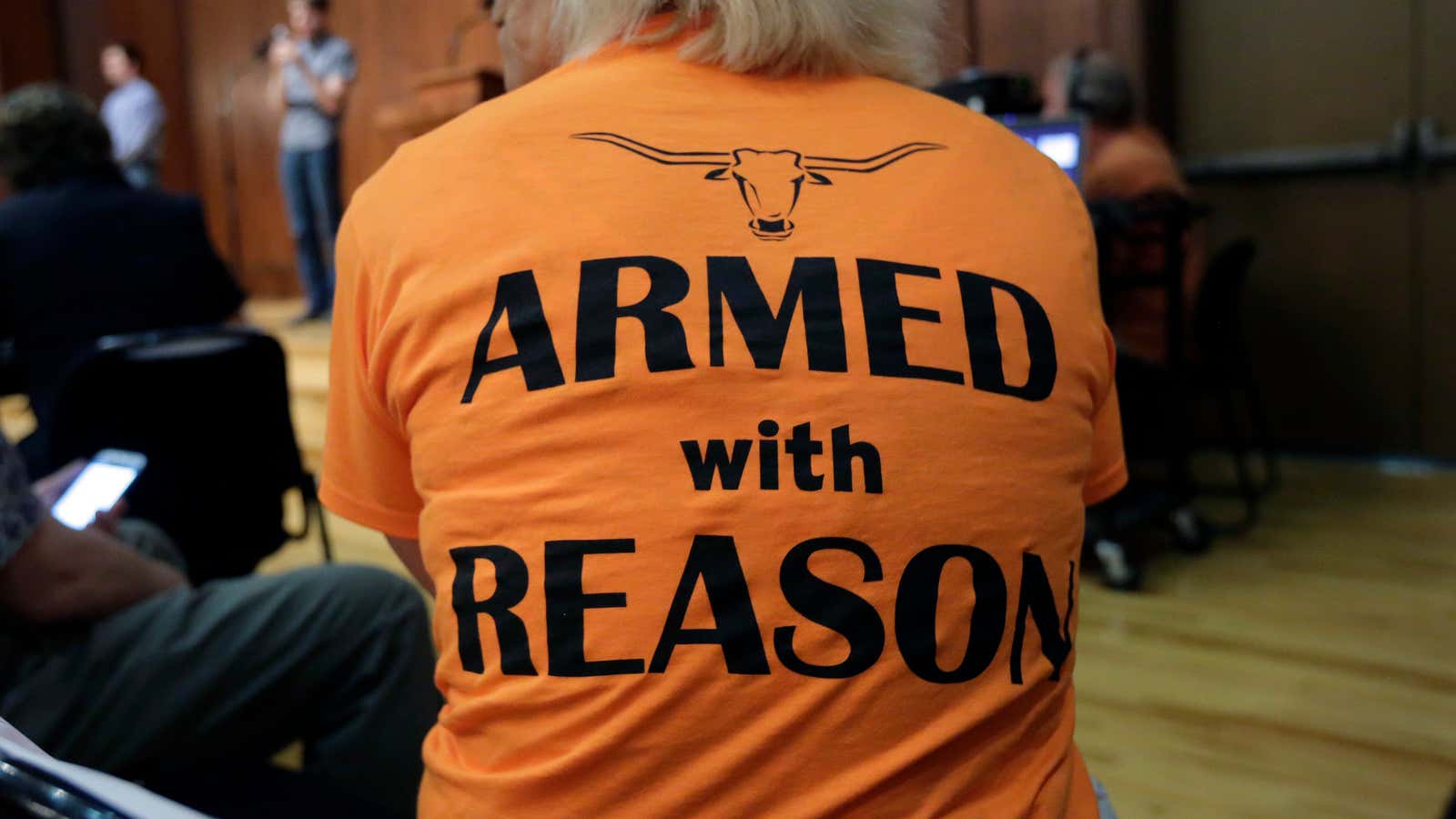*This post has been corrected.
Students at public universities in Texas will be allowed to carry concealed weapons on campus come Aug. 1, 2016, thanks to “campus carry” legislation passed by the Texas state congress in 2015.
The people behind the law, including Texas governor Greg Abbott, argue that “campus carry” will make students safer by mitigating the threat of mass shootings on campus. But the majority of academics throughout the state disagree, fearing that the presence of guns will inhibit scholarship at their universities.
University of Texas at Austin president Gregory Fenves vocalized the latter group’s primary argument in an open letter published on Feb. 17:
“The presence of handguns at an institution of higher learning is contrary to our mission of education and research, which is based on inquiry, free speech, and debate.”
While these points are no doubt valid, the argument misses a potentially more imminent and dangerous implication of the law. Increasing the presence of loaded weapons on campus could very well heighten the likelihood of students experiencing sexual assault.
Studies on the relationship between domestic violence and guns show that when guns are introduced into a domestic violence situation, the risk that a woman who lives in that home will end up dead increases threefold. Additionally, over 73% of concealed handgun license (CHL) holders in Texas are male, and hostile gun displays intended to coerce victims are most often directed against women.
These facts are true for the general US population, and it is reasonable to assume that they will be true for students at UT affected by “campus carry.”
I first raised my concern about the link between sexual assault and the law last fall, when I addressed a working group assembled to help draw up UT’s ”campus carry” implementation policies. Unfortunately, it appears the continuing efforts of the pro-gun lobby to influence research and evidence worked on the Campus Carry Policy Working Group at the university. In their final report, the group said that “the evidence does not in any way support the claim of a causal link between campus carry and an increased rate of sexual assault.” President Fenves subsequently adopted their position in the policies he issued governing “campus carry” at UT, which allow armed CHL holders in residence hall common spaces and as visitors in dorm rooms.
Students for Concealed Carry, the most visible, well-funded peddler of misleading information on pro-campus carry in the nation, has made claims arguing that “campus carry” will deter sexual assault on college campuses by allowing women to arm themselves. But this is disproven by a study published in 2015 that focused specifically on the relationship between guns and sexual assault at universities in Utah and Colorado, two out of nine states where “campus carry” is currently legal.
The study, which was run by the Campaign to Keep Guns Off Campus, compiled data based on FBI Uniform Crime Reports and Clery Act data from 2004-2013. It found that, contrary to the pro-gun lobby’s claims, the presence of guns on campus did not deter sexual assault. In fact, campuses in Colorado and Utah that were forced to introduce “campus carry” over this 10-year period have shown a marked increase in reports of sexual assault.
Given that Colorado and Utah shield the identities of concealed-carry license holders, there is no way to know if people who hold CHLs were the perpetrators of these acts of sexual violence. But CHL holders do not need to commit specific assaults for us to draw a reasonable correlation between the presence of guns and increasing sexual violence on a college campus. The mere fact that guns are more easily accessible has the potential to change perceptions of safety for the victim.
Modern colleges are spaces that reflect the reality of a society that includes powerful women and challenges traditional male claims to unquestioned dominance and privilege. Guns are a quick and easy way for men, young and old, to reaffirm their masculinity. This poses a clear danger to the women that surround them.
Beyond the likely correlation between “campus carry” and increased incidences of sexual assault in Colorado and Utah lies a darker, verifiable statistical truth. CHL holders are less likely than the general population to be convicted of a crime. But when CHL holders are convicted, according to research conducted by the Texas A&M Health Science Center in 2013, the kinds of crimes they do commit are disproportionately related to sexual violence. Given the fact that universities already struggle with prosecuting sexual assault on campus, this is further reason to reduce the presence of guns on campus rather than encourage it.
A policy that adds guns into the complex mix of co-ed college life under the pretense of increasing campus safety–while offering no parallel effort to promote the arguably more effective tactics of unarmed self-defense among students–will only work to increase incidences of sexual assault on campus.
Correction: This post has been updated to reflect the fact that Colorado and Utah are only two of nine states that have adopted different versions of “campus carry.”
